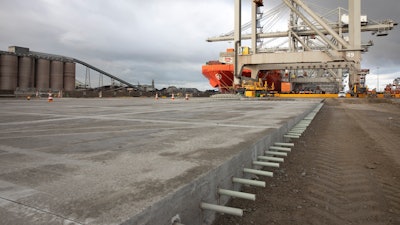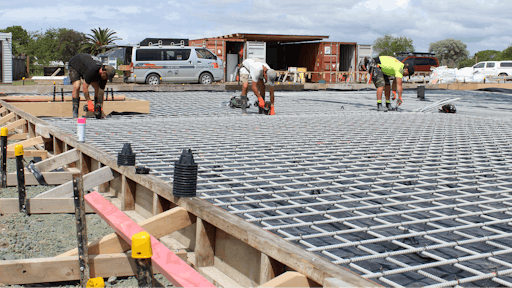Checking out the Advantages of Composites in Building
Checking out the Advantages of Composites in Building
Blog Article
Discovering the Uses and Advantages of Recycled Composites in Modern Industries
The combinations of recycled products with advanced composite innovations provides a promising method for boosting sustainability, resilience, and cost-efficiency across different fields. As sectors look for innovative options to resolve ecological issues and boost functional efficiencies, the unification of recycled compounds arises as a compelling choice.
Ecological Benefits of Recycled Compounds
The usage of recycled compounds in modern-day industries uses considerable environmental advantages, adding to the decrease of waste and the preservation of natural deposits. By including recycled compounds right into producing processes, industries can decrease their dependence on virgin materials, thereby decreasing the amount of waste generated and the energy required for extraction and production. This shift in the direction of using recycled compounds helps in diverting materials from garbage dumps, reducing the concern on waste administration systems, and lowering greenhouse gas exhausts related to standard manufacturing practices.
In addition, making use of recycled compounds advertises the preservation of natural deposits such as timber, minerals, and water, which are frequently depleted with the extraction and processing of resources (composites). By expanding the life expectancy of materials through recycling, markets can help preserve environments and biodiversity by decreasing the need for brand-new resources. In general, the adoption of recycled compounds in contemporary industries plays an important role in advertising sustainability and reducing the environmental impact of manufacturing processes
Boosted Longevity in Item Production
With a concentrate on durability and robustness, incorporating recycled compounds into product production procedures enhances durability and sustainability. By using recycled compounds, suppliers can produce items that are not only solid but likewise immune to deterioration, making them perfect for lasting use in various markets. The mix of various materials in recycled compounds can usually lead to boosted strength and resilience contrasted to typical products, supplying an affordable service for generating lasting items.
One of the crucial benefits of using recycled composites in product manufacturing is the capability to customize the product properties to meet particular sturdiness needs. By adjusting the composition and manufacturing techniques, suppliers can customize the recycled composites to hold up against harsh environmental conditions, hefty loads, or regular use without endangering on efficiency. This flexibility in layout and manufacturing permits the creation of highly resilient items that maintain their integrity over time, reducing the need for frequent replacements and ultimately contributing to a more sustainable manufacturing process.
Cost-Effectiveness and Economic Advantages
Integrating recycled compounds into product manufacturing not just enhances resilience and sustainability yet likewise uses substantial cost-effectiveness and economic benefits. Making use of recycled compounds can result in minimized product expenses as recycled products are frequently more economical than virgin products. In addition, recycling composite materials can reduce waste disposal expenditures and lower the demand for landfill space, contributing to total cost savings for markets.

Advancement and Style Adaptability With Recycled Compounds
Using recycled compounds in modern markets uses unmatched opportunities for technology and style adaptability. By incorporating recycled materials into composite manufacturing processes, firms can press the limits find of typical design view it restrictions and explore new possibilities. The versatility of recycled composites permits the development of complicated forms and frameworks that may not be achievable with conventional materials.
Among the essential advantages of recycled compounds is their capability to be formed into numerous types, giving developers the flexibility to explore distinct shapes and sizes. composites. This adaptability opens a world of imaginative possibilities, enabling the growth of lightweight yet durable products that meet the certain requirements of various sectors
Additionally, making use of recycled compounds advertises lasting practices and sustains the circular economic situation by minimizing waste and lessening the environmental impact of manufacturing processes. This concentrate on green style remedies aligns with the growing trend towards sustainability in modern markets, making recycled composites a beneficial source for cutting-edge and forward-thinking companies.
Applications Across Different Industries
Recycled compounds locate varied and impactful applications throughout a variety of sectors because of their special homes and sustainability advantages. In the automobile field, these products are increasingly used for making long lasting and light-weight components, enhancing fuel performance and reducing Visit Website carbon exhausts. The aerospace industry advantages from recycled composites in the manufacturing of airplane parts, where the materials' strength-to-weight ratio is vital for making certain safety and efficiency. In building and construction, these composites are utilized for producing strong yet environmentally friendly structure products, adding to lasting infrastructure growth. The eco-friendly power field utilizes recycled composites in wind turbine blades and solar panels, harnessing their strength and resistance to harsh environmental problems. In addition, the marine market makes use of these products for producing watercraft hulls and components, using improved resilience and deterioration resistance. The flexibility and sustainability of recycled composites make them beneficial throughout various sectors, driving advancement and ecological stewardship. composites.
Final Thought
In conclusion, the application of recycled compounds in modern-day industries supplies significant ecological benefits, improved resilience in product manufacturing, cost-effectiveness, and economic advantages. Additionally, using recycled composites permits development and style versatility throughout different sectors. Generally, the adoption of recycled composites presents a sustainable and useful service for fulfilling the demands of the market while also reducing ecological influence.

One of the key benefits of using recycled composites in product manufacturing is the capacity to tailor the material residential properties to satisfy specific sturdiness needs. Utilizing recycled composites can lead to decreased product expenses as recycled products are commonly less pricey than virgin materials. The aerospace sector benefits from recycled composites in the production of airplane components, where the materials' strength-to-weight proportion is essential for making sure safety and efficiency.
Report this page